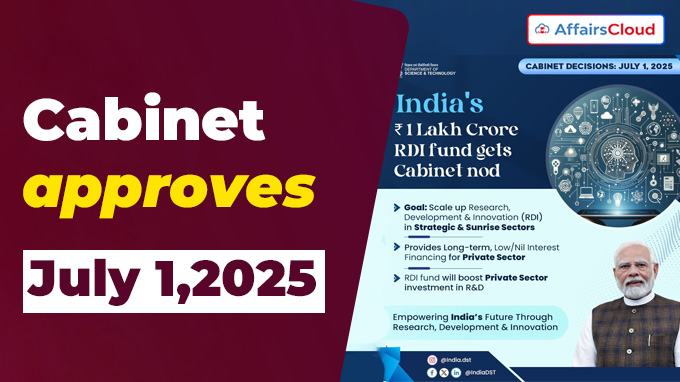 On July 1, 2025, the union cabinet chaired by Prime Minister (PM) Narendra Modi approved the following proposals:
On July 1, 2025, the union cabinet chaired by Prime Minister (PM) Narendra Modi approved the following proposals:
i.Cabinet Approves National Sports Policy (NSP) 2025 also known as Khelo Bharat Niti 2025.
ii.Cabinet Approves Employment-Linked Incentive Scheme to support formal job creation
iii.Cabinet Approves Research Development and Innovation (RDI) scheme to boost RDI in Strategic and Sunrise Domains
iv.Cabinet Approves Construction of 4-Lane Paramakudi-Ramanathapuram Section National Highway (NH-87) in Tamil Nadu (TN) worth Rs.1853 crores.
Union Cabinet Approved National Sports Policy 2025:
The Union Cabinet has approved the National Sports Policy (NSP) 2025 known as Khelo Bharat Niti, 2025, with the aim of making India one of the top five sporting nations by 2047.
- NSP 2025 replaces the existing NSP 2001 with an aim to make India a strong contender for excellence at international sporting events including hosting the 2036 Olympic Games. The policy is anchored on five key pillars
Five Pillars of NSP 2025:
i.Excellence on the Global Stage: The policy aims to strengthen sports programs from grassroots to elite levels, including mechanisms for early identification and nurturing of talent, to train and develop sports personnel, including coaches, technical officials, and support staff.
- It encourages the adoption of sports science, medicine, and technology to boost athletic performance.
ii.Sports for Economic Development: The policy recognizes the economic potential of sports and seeks to promote tourism and attract major international events to India. It aims to strengthen the sports manufacturing ecosystem and promote startups and entrepreneurship in the sector.
- The policy also encourages private sector participation through Public-Private Partnerships (PPPs), Corporate Social Responsibility (CSR) and innovative funding initiatives.
iii.Sports for Social Development: NSP 2025 emphasizes the role of sports in driving inclusion by promoting participation among women, economically weaker sections, tribal communities, and persons with disabilities through focused programs.
iv.Sports as a People’s Movement: To make sports a national movement, the policy aims to drive mass participation and a culture of fitness through nationwide campaigns and community-based events.
- The policy aims to launch fitness indices for schools, colleges and workplaces, and to enhance universal access to sports facilities.
v.Integration with Education: In alignment with the National Education Policy (NEP) 2020, the NSP 2025 proposes to integrate sports into the school curriculum, to equip educators and physical education teachers with specialized training to promote sports education and awareness.
Cabinet Approves Employment-Linked Incentive Scheme:
The Union Cabinet chaired by PM Narendra Modi approved an Employment Linked Incentive (ELI) Scheme, as part of the Union Budget 2024-25, with an aim to facilitate employment, Social Security, skilling and other opportunities for 4.1 Crore youth with a total budget outlay of Rs 2 Lakh Crore.
- The ELI scheme aims to generate over 3.5 crore new jobs between August 1, 2025, and July 31, 2027, with a budget of Rs.99,446 crores for 2 years.
- The benefits of the Scheme would be applicable to jobs created between 01st August 2025 and 31st July, 2027.
- The scheme consists of two parts, with Part A focused on first timers and Part B focused on employers.
Part A: Incentive to First Time Employees:
i.The first-time employees, registered with the Employees’ Provident Fund Organization (EPFO), will be offered a one-month EPF wage up to Rs.15,000 in two instalments.
ii.The first instalment will be paid after 6 months of service and the second instalment will be paid after 12 months of service and completion of a financial literacy programme by the employee.
iii. To encourage the saving habit, a portion of the incentive will be kept in a savings instrument of deposit account for a fixed period and can be withdrawn by the employee later. Part A will benefit around 1.92 crore first time employees.
Part B: Support to Employers:
i.Part B will cover the generation of additional employment in all sectors, with a special focus on the manufacturing sector.
ii.The employees will get incentives in respect of employees with salaries up to Rs.1 lakh. The government will incentivize employers, up to Rs.3,000 per month, for two years, for each additional employee with sustained employment for at least six months.
- For the manufacturing sector, incentives will be extended to the 3rd and 4th year as well.
iii.An employer receives Rs.1,000 per additional employment per month for a newly added employee with the EPF wage of Up to Rs.10,000. An employer will receive Rs.2,000 for an employee with an EPF wage of more than Rs.10,000 and up to Rs.20,000.
- An employer will receive Rs.3,000 for an employee, receiving more than Rs.20,000 as incentives.
iv.Establishments, which are registered with EPFO, will be required to hire at least two additional employees (for employers with less than 50 employees) or five additional employees (for employers with 50 or more employees), on a sustained basis for at least six months.
Payments Mode of Incentives:
i.All payments to the First Time Employees under Part A of the scheme will be made through Direct Benefit Transfer (DBT) mode using Aadhar Bridge Payment System (ABPS).
ii.The payments to the Employers under Part B will be made directly into their Permanent Account Number (PAN)-linked Accounts.
Cabinet Approves Research Development and Innovation (RDI) scheme:
The Union Cabinet approved the Research Development and Innovation (RDI) scheme with a corpus of Rs. 1 lakh crore, with an aim to bolster India’s research and innovation ecosystem.
- The RDI scheme aims to provide long-term financing or refinancing with long tenors at low or nil interest rates to increase private sector investment in RDI.
Objectives of RDI scheme:
i.The scheme has been designed to overcome the constraints and challenges in funding the private sector and seeks to provide growth and risk capital to sunrise and strategic sectors to facilitate innovation, promote adoption of technology and enhance competitiveness.
- The department of science and technology (DST) will serve as the nodal implementing agency.
ii.The key objectives of the scheme are
- To encourage the private sector to scale up RDI in sunrise domains and in other sectors relevant for economic security, strategic purpose, and self-reliance.
- To Finance transformative projects at higher levels of Technology Readiness Levels (TRL)
- To Support the acquisition of technologies which are critical or of high strategic importance
- To facilitate the setting up of a Deep-Tech Fund of Funds.
RDI Scheme:
i.The RDI scheme will have a two-tiered funding mechanism. At the first level, there will be a Special Purpose Fund (SPF), established by the New Delhi (Delhi) based Anusandhan National Research Foundation (ANRF), which will act as custodian of funds.
ii.From the SPF, funds will be allocated to a variety of 2nd level fund managers. It will be mainly in the form of long-term concessional loans. The funding of Research and Development (R&D) projects by the 2nd level fund managers would be in the form of long-term loan at low or nil interest rates.
iii.The Governing Board of ANRF, chaired by PM Narendra Modi, will provide overarching strategic direction to the scheme. The Executive Council (EC) of ANRF will approve the scheme’s guidelines. while an Empowered Group of Secretaries (EGoS) led by the Cabinet Secretary will oversee performance reviews and approve changes as required.
Note: Sunrise sectors are industries in their early stages of development with high potential and significant impact on the economy.
Cabinet Approves Construction of 4-Lane Paramakudi-Ramanathapuram Section in TN
The Union Cabinet has approved the construction of 4-Lane Paramakudi-Ramanathapuram Section, a 46.7 Kilometre (Km) National Highway (NH-87) in TN.
- The project will be developed on Hybrid Annuity Mode (HAM) at a total capital cost of Rs.1,853 crores, including Total Civil Cost of Rs. 997.63 crores and Land Acquisition Cost of Rs. 340.94 crores.
i.The project alignment integrates with 5 major NH (NH-38, NH-85, NH-36, NH-536, and NH-32) and 3 State Highways (SH-47, SH-29, SH-34), providing seamless connectivity to key economic, social, and logistic nodes across southern TN.
ii.The upgraded corridor will enhance multi-modal integration by connecting 2 major Railway stations (Madurai and Rameshwaram), 1 Airport (Madurai), and 2 minor ports (Pamban and Rameshwaram), facilitating faster movement of goods and services.




